by Ørecomm on 2009 March 7 15:02
The “XI UN C4D RT” is scheduled to take place in Washington DC, 11-13 March 2009. The acronym stands for the 11th UN Inter-Agency Round Table on Communication for Development. A number of meeting documents and background papers are available on the Ørecomm site. They may be interesting to several orecomm.net readers, whether we are (potential) players in the game, or profoundly critical – or we may just want to stay well informed. It is our common field of interest. To know more, go to the document page.
Listings (pdf):
Theses and reports with abstracts, Malmö University 2001-2008, 82 titles.
Theses and reports with abstracts, Roskilde University 1997-2008, 24 titles.
Available electronically (pdf):
Bazán, César: Communications Framework for HIV Vaccine Trials. MAH 2004.
Belcastro, Helen: Internet as a tool for communication. Information and participation among tertiary students in Namibia. MAH 2002.
Bellanca, Raffaella: Diffusion of innovations: reforestation in Haiti. MAH 2007. Keywords: Reforestation, Haiti, sustainable development, diffusion of Innovations.
Berwick, Michael: Media without a veil? Press freedom in Indonesia. MAH 2002.
Buch Larsen, Martin: Ingando – when enemies return. RUC 2006. Keywords: Informative documentaries, cultural media production, participatory communication.
Dali, Blay-Azu and Mette L’Herbier: AIDS Campaigns & Sexuality in Côte d’Ivoire (Ivory Coast): A study of the sexual norms and practices of students at the University of Abidjan (Cocody). RUC 2005. Keywords: health communication, ABC strategies, social norms and practices, social and political change.
Enghel, Florencia: Indigenous, yes: participatory documentary-making revisited (an Argentine case study). MAH 2005. Keywords: communication, development, communication for development, participatory communication, indigenous, documentary making.
Ericsson, Björn: Radio as means to support agricultural development. A case study in Zambia. MAH 2001.
Ericsson, Rosita: Communicating Rights for Children. A study of children´s participation in a radio campaign in West Africa. MAH 2002.
Frykheden, Louise: Voices of South Africa – Internet-based education for communication and globalization. MAH 2004. In Swedish. Keywords: internet, South Africa, education.
Granqvist, Manne: Assessing ICT efforts in marginalized regions from a critical social viewpoint. Learning from the case of Lincos. MAH 2003.
Grøndahl Hansen, Mette; Stine Kromann-Larsen and Lise Grauenkær: Voice of Mpemba – An analysis of empowerment processes in a Malawian youth club fighting HIV/AIDS. RUC 2008. Keywords: communication for social change, development communication, community media, civil society, empowerment.
Gupta, Sanjay: ICTs for the Poorest of the Rural Poor–Now and How? MAH 2004.
Hansson Gossé, Kerstin: Media against AIDS. MAH 2002. Keywords: media, HIV, AIDS, Tanzania.
Harr, Henrik: Salvaging Article 19. A tightrope act for media aid to Southeast Asia. MAH 2001.
Hedenbro, Marianne: The role of media for peace and democracy in Somaliland. A study of a training project for journalists. In Swedish. MAH 2001.
Hell, Maud: School Libraries in a Democratic South Africa. MAH 2005. Keywords: South Africa, information literacy, library, school.
Jakobsen, Gitte: Techno-fetishism or communication for development. The potentials of Internet and e-mail communication for student organisations in southern Africa. MAH 2002.
Johansson, Sara: Walking the tightrope – can storysharing play a part in reconciliation? MAH 2005. Keywords: reconciliation, conflict theory, narrative, remembering, group identity.
Kracht, Gunilla: Exporting public service. MAH 2001.
Kromann-Larsen, Stine; Mette Grøndahl Hansen, Martha Topperzer, Stine Vikkelsøe and Lise Grauenkær: Soul Buddyz Tomorrow is Ours – an edutainment communication strategy. RUC 2006. In Danish. Keywords: strategic communication, edutainment, education and learning, social modelling, health communication, behaviour and social change.
Larsson, Maud: Digital distance education – an easy option for developing countries or colonialism in a new millennium? A study of a cyberforum for women journalists in Africa. MAH 2001.
Leijel, Anneli Ström: The New Press Law in Indonesia. Just a paperwork or a real step towards more freedom of the press? MAH 2002.
Lund Larsen, Kirstin: Which future role for communication in Danish development aid? MAH 2002.
Maputseni, Clever: Using Radio for Advocacy and Communication of Issues Affecting Farm Communities in Zimbabwe. MAH 2006. Keywords: Communication for development, radio, advocacy, Zimbabwe, participation, empowerment.
Metz Pedersen, Janus: Far away but close – an analysis of media’s importance in cultural globalisation processes explored through the history of ethnographic film. RUC 2005. In Danish. Keywords: The cultural Other, globalisation, democratisation, development discourse.
Millinger, Lena: Does Africa Need Museums? Communication of Culture for Development in Senegal and Mali, West Africa. MAH 2004.
Navarro, Amelia Morales: Sexto Sensido – Empowerment through the Media. RUC 2005. Keywords: Empowerment, communication and social and political change, edutainment.
Ngenge, Torja: Sex, AIDS and Videotape. Video as a tool in informing about HIV/AIDS among young people in rural Mozambique. MAH 2003.
Nilsson, Maria: From opposition to a monthly magazine. A new role for Indonesian press. MAH 2002.
Nissen, Helle Catarina: Ugandan Men as Partners – An analysis of UNFPAs and the Ugandan government’s representations of men and masculine identity in campaigns for male participation in reproductive health. RUC 2005. In Danish. Keywords: health communication, behaviour change, participation, media-advocacy, male representations.
Pruth, Charlotte: Sun, Sea, Sex and Swedes. A study of campaigns to prevent sex tourism in Natal/Brazil and Stockholm/Sweden. MAH 2007. Keywords: sex tourism, sustainable tourism, image of Brasil, post-colonialism, exotism, tourism advertisment.
Ringman, Mikael: Journalist education after Suharto. A field study in Bandung, Bengkulu and Jakarta. MAH 2002.
Runesson, Linda: Media in conflict areas. The case of the Manu River Union. MAH 2003.
Rutberg, Ingela: New role for the press in Indonesia. A study of the newly established magazine Pantau. MAH 2002.
Rörström, Kristina: “Good things happen here as well”. Arts activities for social transformation amongst children and adolescents – a case study in Argentina. MAH 2004.
Sverud, Louise: An imagined community – Britons in Lanzarote. MAH 2001.
Taketani, Keisuke: Intercultural Communication for Development: An exploratory study of Intercultural Sensitivity of the United Nations Volunteer Programme using the Developmental Model of Intercultural Sensitivity as framework. MAH 2008. Keywords: communication for development, intercultural sensitivity, culture, UNV.
Warah, Rasna: Divided City: Information Poverty in Nairobi´s slums. MAH 2004.
Westberg, Gabriella: Digital communication for development in Nepal – an evaluation of communication structures and development messages. MAH 2004.
Widmark, Annica: AIDS communication through entertainment-education. A case study of the film Amah Djah-foule produced by Project Retro-CI och PSI/ECODEV in Ivory Coast. MAH 2002.
by Thomas on 2009 January 14 02:29
International Association for Media and Communication Research
IAMCR’s new working group in Health Communication and Change invites submissions for the next IAMCR Conference, to be held in Mexico City, 21-24 July 2009. The theme of the conference is “Human Rights and Communication”. (more…)
by Ørecomm on 2008 November 16 00:02
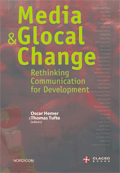 In 2005 Oscar Hemer and Thomas Tufte published the 493-page anthology Media & Glocal Change. Rethinking Communication for Development, through publisher co-operation between Nordicom and CLACSO (Consejo Latinoamericano de Ciencias Sociales) in Buenos Aires.
In 2005 Oscar Hemer and Thomas Tufte published the 493-page anthology Media & Glocal Change. Rethinking Communication for Development, through publisher co-operation between Nordicom and CLACSO (Consejo Latinoamericano de Ciencias Sociales) in Buenos Aires.
The CLACSO Biblioteca Virtual has now made the complete text of the book available online, divided into chapters for easier download in separate pdf-files.
(more…)
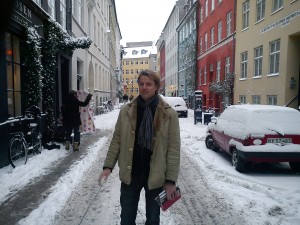 |
Cand. mag., PhD
External lecturer
Department of Communication, Business
and Information Technologies
Roskilde University
E-mail: keha@ruc.dk |
I’m a communication professional working as university teacher, part time researcher, project developer, consultant, and freelance journalist. I have worked with Information and communication tehcnology (ICT), knowledge managment, project management, innovation, organizational theory, complexity theory, Corporate Social Responsibility, critical theory and political economy.
My latest writings are about “meaningfull experiences” – I published a book about this issue in 2011 – and my lectures often deal with a combination of value management and experience design (“værdibaseret oplevelsesdesign”, “oplevelsesbaseret værdiledelse”). A constant focus is on ethics, which I see as a reflective process between norms and emotions that constantly creates and recreates values.
A selection of my publications can be found at my website.
My interest in Orecomm is focused on the combination of experience economy and design, communication for development, ICT and complexity theory. This combination reflects an interest in facilitating communication for development by enlarging the traditional view to include new media and experience design.
I have for example participated in the project “Digidi Ghana” funded by The Danish International Development Assistance, Danida, and supported by the World Bank in Ghana. Digidi (Digital Distribution, http://www.digidi.org), is a global co-operative society, established in Copenhagen in 2003. It is a non-profit, non-governmental organization that has successfully established a global digital distribution net, through which shareholders can sell digital cultural products in more than 60 online shops all over the world. It is currently owned by approximately 1100 participants coming from a wide array of fields in the global experience economy. Each participant holds an equal share.
Digidi Ghana is an attempt to develop this idea into a global fair trade concept within a development agenda. In Ghana, as in other developing countries, mass production and global distribution of digital cultural products is an often overwhelmingly complex and expensive affair which requires substantial investment beforehand. By instead distributing these products through the Internet, a Ghanaian artist for example, can receive up to 85 % of the income from the sale, since there are no unnecessary intermediate stages between producer and consumer. The establishment of such a new fair trade concept, with its use of advanced digital media in an unusual context is, however, a highly complex and challenging task. Among many things it involves unusual partnerships, intensive and very special experience based PR-work, powerful negotiation skills, and, above all, the skill to navigate immediately and powerfully in an environment in total flux. A paper about this case can be found here.
Recently I have been to Minas Gerais in Brazil where I have tried to develop a workshop in entrepreneurship. I also made two reports, one about the worlds worst company, “Vale” which incredible behavior is absolutely destructive for people, nature and the developing experience economy. This report can be viewed here (in Danish): Den jernhårde oplevelse. The second report is about a small entrepreneur in the new Brazilian experience economy. The videoreport can be viewed here (also in Danish): Cynthia og pão de queijo-fabrikken.
In general I like to work with project development and often write about experiments, examples and cases. I’m almost always involved in the ongoing development of a handful of other projects. I try to update as much as possible on my website.
My research focuses on new actors and alliances in North-South relations and Brand Aid. I am co-author of “Brand Aid: Shopping Well to Save the World” with Stefano Ponte (2011) – a political economy of culture examining Product (RED), branding, aid, consumption and celebrity. I have worked on research projects on HIV/AIDS treatment in Uganda and South Africa and reproductive health in Tanzania and Uganda. I teach and supervise graduate students in development studies and global studies.
I teach as often as possible in the Communication for Development Masters course with Oscar Hemer and have enjoyed writing collaborations with other Ørecomm researchers, including ”Mobilizing for Global AIDS Treatment: Clicking Compassion and Shopping Salvation” in Glocal Times/Nordicom Review Special Issue on “Mobilizing Communication Globally: for What and for Whom?,” edited by K. Wilkinson and F. Enghel (2012).
I’m part of a group of researchers with interest in how celebrities shape North-South relations. Visit our website for information on our work and upcoming activities.
Contact me for speaking engagements on Brand Aid or PhD projects on new actors and alliances in development.
Selected publications
Lisa Ann Richey: Population Politics and Development: From the Policies to the Clinics (2008) Palgrave MacMillan: New York and London.
Lisa Ann Richey: “‘Boundary Work’ in the Provision of AIDS Treatment in South Africa: Science, Denial and Politics” New Political Science, 30,1: 1-21 (2008).
Lisa Ann Richey and Stefano Ponte: “Better RED Than Dead? From ‘Band Aid’ to ‘Brand Aid’ “, Third World Quarterly, (forthcoming 2008).
Lisa Ann Richey: Gendering the Therapeutic Citizen in Reproduction, Globalization and the State. Carole H. Browner and Carolyn F. Sargent, eds. Durham, NC: Duke Univ. Press (forthcoming 2008).
Thomas Molony, Lisa Ann Richey, and Stefano Ponte: “‘Darwin’s Nightmare’: A Critical Assessment” Review of African Political Economy. No. 113. Pp. 591-608 (2007).
“The Rock Man’s Burden? Product (RED), Celebrities and Women at the Frontier of Development Assistance in The Fourth Wave: An Assault on Women. Gender, Culture and HIV in the 21st Century. Social Science Research Council-UNESCO volume, Vinh-Kim Nguyen and Jennifer F. Klot, eds. (forthcoming 2008).
The challenges of public health have for many years been the single most important sector within Communication for Development. Since the early nutrition campaigns of the 1960s in Africa health communication has existed as a field of communication practice. It has passed through a broad variety of public health foci (family planning, polio eradication, tb, sexual and reproductive health and rights. At Ørecomm the research will be based on a broad understanding of health as determined by the Ottawa Charter (1986) which emphasized the social determinants of health.
In the past 15 years health communication has been severely challenged by the proliferating HIV/AIDS pandemic. A complex pandemic as HIV/AIDS demanded equally complex communication responses in the campaigns designed. However this move from narrow marketing of messages in many social marketing campaigns to complex communication for social change oriented campaigns has been very slow in gaining impetus. It is from the last decade of critical reflection within HIV/AIDS communication for prevention that the emerging paradigm of communication for social change has evolved. Ørecomm researchers are actively involved in research, policy development and practice of HIV/AIDS communication and have been actively involved in the international debate on HIV/AIDS communication. This is thus already a well-established research strand in Ørecomm.


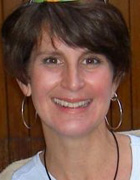
 New PhD opportunities at the University of Leicester
New PhD opportunities at the University of Leicester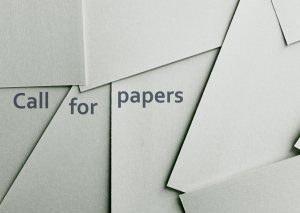 Call for Abstracts: New Directions in Media, Communication and Sociology (NDiMS) Conference
Call for Abstracts: New Directions in Media, Communication and Sociology (NDiMS) Conference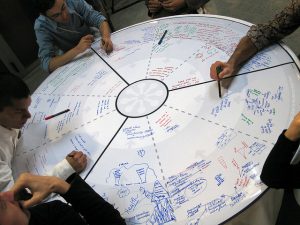 Ørecomm Team to Gather at the University of Coimbra
Ørecomm Team to Gather at the University of Coimbra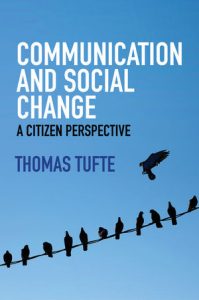 “Communication and Social Change – A Citizen Perspective” Published
“Communication and Social Change – A Citizen Perspective” Published C4D Network to Sum Up Global Communication for Development Practice
C4D Network to Sum Up Global Communication for Development Practice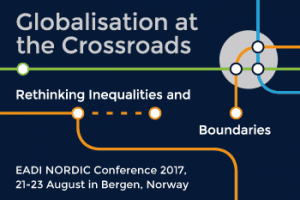 Entering Media and Communication into Development Conferences?
Entering Media and Communication into Development Conferences?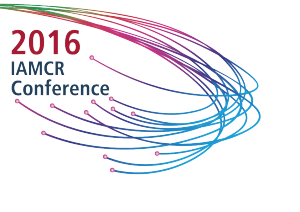 IAMCR Conference 2016: Communication for Development Highlights
IAMCR Conference 2016: Communication for Development Highlights Glocal Classroom Revisited – Storytelling & Social Change Leicester-Malmö
Glocal Classroom Revisited – Storytelling & Social Change Leicester-Malmö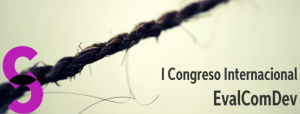 I EvalComDev International Conference: Call for Papers
I EvalComDev International Conference: Call for Papers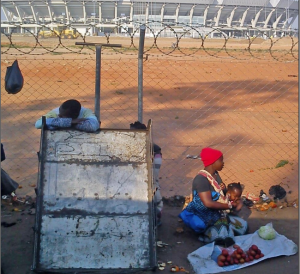 Looking for Media and Communication in Development Conferences: Devres 2016
Looking for Media and Communication in Development Conferences: Devres 2016